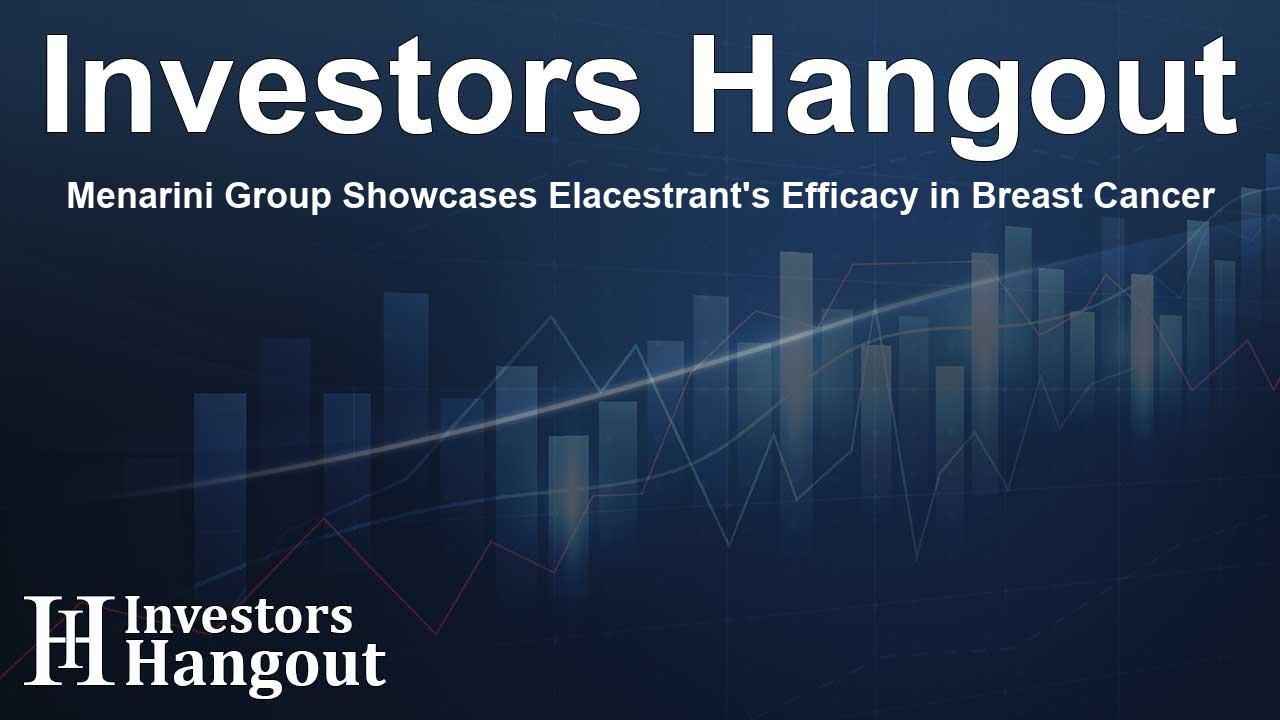Menarini Group Showcases Elacestrant's Efficacy in Breast Cancer

Menarini Group Highlights Elacestrant in Breast Cancer Treatment
The Menarini Group, a prominent name in the pharmaceutical industry, introduces updated data revealing the combinability of elacestrant, a key player in the treatment of estrogen receptor-positive (ER+), HER2-negative (HER2-) metastatic breast cancer (mBC). With recent findings expected to create ripples in ongoing therapeutic strategies, this information was presented at the 2025 American Society of Clinical Oncology (ASCO) Annual Meeting.
Insights from the ELEVATE Study
Key preliminary efficacy analysis from cohorts in the ELEVATE study provides insight into elacestrant's efficacy when paired with everolimus and ribociclib. These findings reinforce the potential of elacestrant as a cornerstone in endocrine therapy, particularly when combined with targeted treatments for managing ER+/HER2- mBC.
The ELEVATE study meticulously evaluates six treatment regimens featuring elacestrant, focusing on its collaboration with CDK4/6 inhibitors like palbociclib, abemaciclib, and ribociclib, as well as PI3K/AKT/mTOR pathway inhibitors. Recent updates from ASCO 2025 reveal promising progression-free survival results, particularly in patients receiving elacestrant in conjunction with ribociclib and everolimus.
Encouraging Results from Clinical Trials
Dr. Hope S. Rugo, from the City of Hope Comprehensive Cancer Center, expressed optimism regarding the study outcomes when elacestrant is combined with these targeted therapies. The results align with the encouraging data previously shared concerning elacestrant’s performance alongside abemaciclib. As these clinical trials progress, there is growing anticipation surrounding elacestrant's role as a foundational treatment component for advanced breast cancer.
Importance of Updated Safety Data
In parallel with efficacy results, updated safety data from the ELEVATE study evaluates the safety profiles of elacestrant combined with ribociclib, everolimus, alpelisib, and capivasertib. These results affirm the compatibility of these combinations with existing standard endocrine therapies.
Elcin Barker Ergun, CEO of the Menarini Group, underscored the significant implications of these findings for the market and emphasized initiatives aimed at expanding elacestrant's potential to benefit various patient demographics, including those enrolled in the ELEGANT study focusing on high-risk early breast cancer patients.
Future Directions and Ongoing Research
The Menarini Group is committed to continuous innovation through ongoing research efforts. Their clinical development program investigates elacestrant through multiple channels, emphasizing its versatility as both a standalone therapy and in combination with other agents. This research involves various stages of clinical trials evaluating efficacy in patients with metastatic conditions.
In addition to the pivotal ELEVATE study, the company is engaged in several trials, focusing on elacestrant's efficacy across diverse populations, solidifying its role in the treatment landscape of breast cancer.
Menarini Group and Stemline Therapeutics Overview
As a leading international pharmaceutical entity, the Menarini Group operates with a turnover exceeding $4.7 billion and employs over 17,000 individuals worldwide. The company prioritizes therapeutic areas that present substantial unmet medical needs.
Stemline Therapeutics, Inc., a wholly-owned subsidiary of Menarini, is dedicated to transformative oncology treatments and is central to ensemble research initiatives surrounding elacestrant. Through its endeavors, the group aims to deliver innovative solutions to cancer patients globally, further affirming its position in the oncological sector.
Frequently Asked Questions
What is the significance of the ELEVATE study?
The ELEVATE study offers pivotal insights into the effectiveness of elacestrant in combination with targeted therapies for treating ER+/HER2- metastatic breast cancer.
How does elacestrant function in combination therapies?
Elacestrant works by potentially enhancing the effects of other targeted agents, thereby improving patient outcomes in breast cancer treatment.
What do the latest results indicate about elacestrant?
Recent results suggest that elacestrant, especially when paired with ribociclib and everolimus, demonstrates favorable progression-free survival rates for patients.
Who are the key figures presenting these findings?
Dr. Hope S. Rugo, among others, plays a crucial role in interpreting and presenting the data surrounding elacestrant and its efficacy.
What future research is planned for elacestrant?
The Menarini Group is committed to exploring elacestrant's potential further through ongoing clinical trials targeting various patient groups and treatment strategies.
About The Author
Contact Riley Hayes privately here. Or send an email with ATTN: Riley Hayes as the subject to contact@investorshangout.com.
About Investors Hangout
Investors Hangout is a leading online stock forum for financial discussion and learning, offering a wide range of free tools and resources. It draws in traders of all levels, who exchange market knowledge, investigate trading tactics, and keep an eye on industry developments in real time. Featuring financial articles, stock message boards, quotes, charts, company profiles, and live news updates. Through cooperative learning and a wealth of informational resources, it helps users from novices creating their first portfolios to experts honing their techniques. Join Investors Hangout today: https://investorshangout.com/
The content of this article is based on factual, publicly available information and does not represent legal, financial, or investment advice. Investors Hangout does not offer financial advice, and the author is not a licensed financial advisor. Consult a qualified advisor before making any financial or investment decisions based on this article. This article should not be considered advice to purchase, sell, or hold any securities or other investments. If any of the material provided here is inaccurate, please contact us for corrections.
